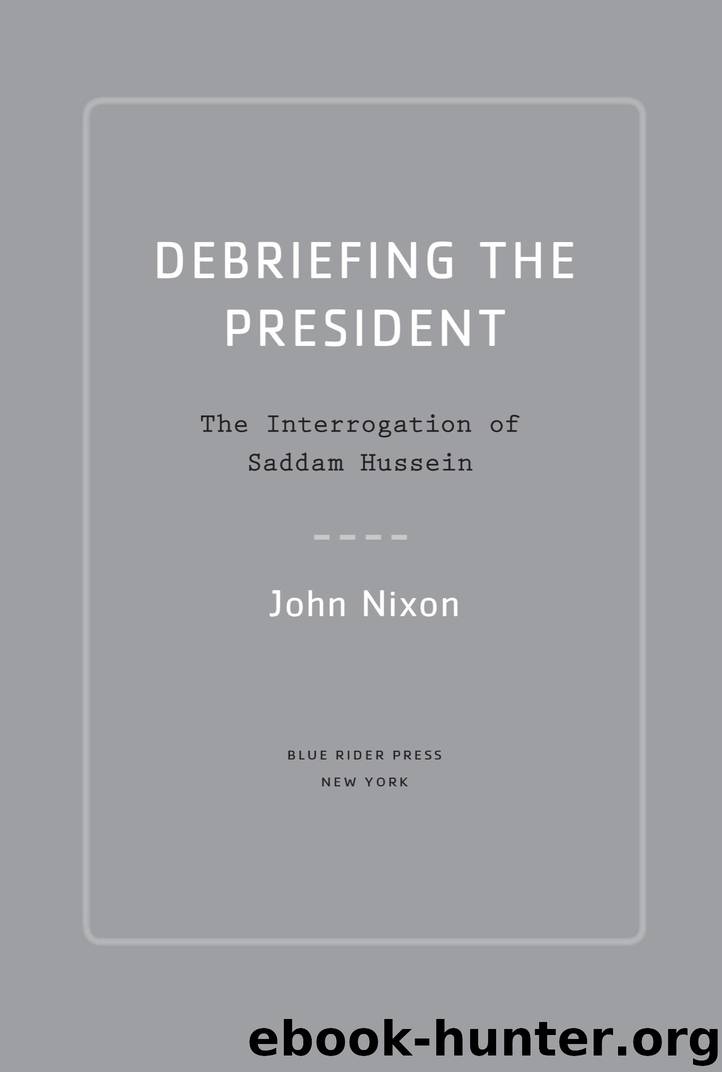Debriefing the President by John Nixon

Author:John Nixon
Language: eng
Format: azw3, epub
Publisher: Penguin Publishing Group
Published: 2016-11-28T16:11:35+00:00
8.
Death to Shiites and Zionists
----------
During the second week of our debriefing we began to discuss regional politics, and although Saddam tried to take the high road and not speak ill of other leaders, sometimes he could not help himself. Saddam did not have a high regard for his fellow Arab leaders. He saw himself as the greatest of the great, head and shoulders above his counterparts in the region. Though he was proud to be a leader of Arabs, he said he didn’t necessarily want to lead all Arabs. “I only want to lead Iraqis,” he said. “They are the noblest of all people.” He saw the late King Hussein of Jordan as a man of dubious reliability and a lackey to Israel and the United States. He had nothing but contempt for the younger generation coming to power, notably Bashir al-Assad in Syria and King Abdullah in Jordan. We asked him about Egypt’s Gamil Abd al-Nasir, the renowned pan-Arabist. Saddam smirked and said, “He was a good man. But he did not live long enough to see his plans through, and he was too quick to make a deal with enemies who would never keep their end of the bargain.” In our conversations, Saddam never singled out another Arab leader for unqualified praise. To him, they were lesser men who had neither his intelligence nor resourcefulness.
A constant refrain in our debriefings was Saddam’s complaints about his imprisonment and his requests for luxury items. He often railed about his lack of writing materials. “You must understand, I am a writer. And what you are doing by depriving me of pen and paper amounts to human rights abuse!” Saddam would also constantly request reading material to pass the time. He told us one of the guards had given him the CliffsNotes for the Arabic version of Fyodor Dostoyevsky’s Crime and Punishment. “This man Dostoyevsky has a remarkable insight into the human condition,” Saddam said. He was also a big fan of the Egyptian novelist Naguib Mahfouz and requested that we purchase for him the Arabic text of his Cairo Trilogy. *******************************************************************************************************************************************************************************************************************************************************************************************************************************************************************
******************************************************************************** We often heard the muffled sounds of bombs set off by the insurgency in the distance. Saddam could clearly infer that things were not going well for the U.S.-led coalition, and he took some pleasure in our struggle to bring stability to his country. It had taken him years to achieve the level of control that he had, and the United States was badly misguided to think it could simply walk in and take his place. The idea that the Iraq invasion would be a “cakewalk”—in the immortal words of Kenneth Adelman, a former Reagan administration official and an admirer of Dick Cheney—was born of breathtaking stupidity and arrogance. Somehow the CIA and other government agencies were never able to impress on policymakers that Saddam was a savvy leader. Instead, some intelligence analysts labeled his country the “Republic of Fear,” after the title of the 1989 book by Kanan Makiya, an Iraqi-born professor at Brandeis University who was a proponent of the U.
Download
This site does not store any files on its server. We only index and link to content provided by other sites. Please contact the content providers to delete copyright contents if any and email us, we'll remove relevant links or contents immediately.
The Secret History by Donna Tartt(19093)
The Social Justice Warrior Handbook by Lisa De Pasquale(12191)
Thirteen Reasons Why by Jay Asher(8914)
This Is How You Lose Her by Junot Diaz(6890)
Weapons of Math Destruction by Cathy O'Neil(6282)
Zero to One by Peter Thiel(5804)
Beartown by Fredrik Backman(5759)
The Myth of the Strong Leader by Archie Brown(5510)
The Fire Next Time by James Baldwin(5450)
How Democracies Die by Steven Levitsky & Daniel Ziblatt(5219)
Promise Me, Dad by Joe Biden(5154)
Stone's Rules by Roger Stone(5088)
A Higher Loyalty: Truth, Lies, and Leadership by James Comey(4965)
100 Deadly Skills by Clint Emerson(4927)
Rise and Kill First by Ronen Bergman(4790)
Secrecy World by Jake Bernstein(4754)
The David Icke Guide to the Global Conspiracy (and how to end it) by David Icke(4720)
The Farm by Tom Rob Smith(4514)
The Doomsday Machine by Daniel Ellsberg(4491)
